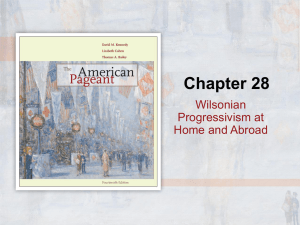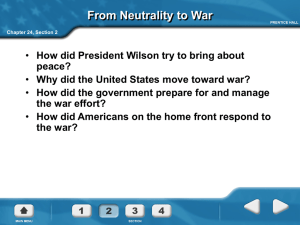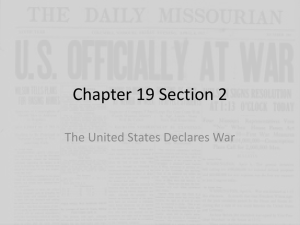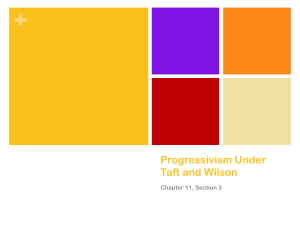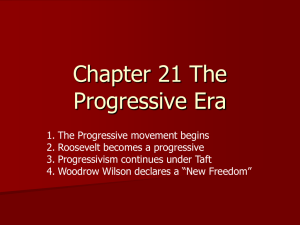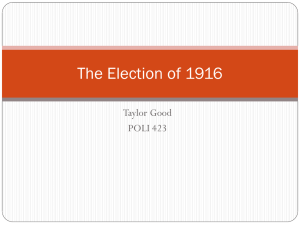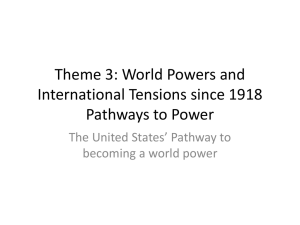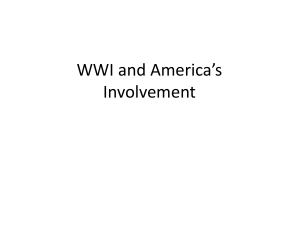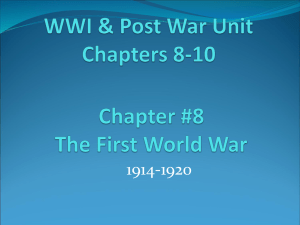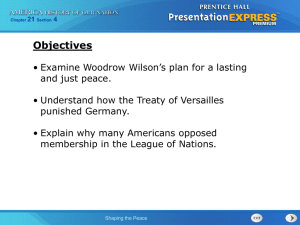MR. LIPMAN`S APUS POWERPOINT CHAPTER 29
advertisement
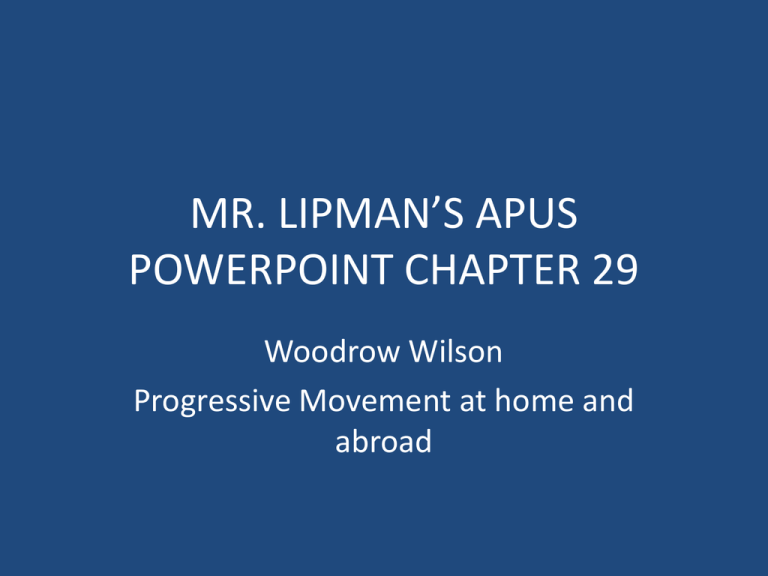
MR. LIPMAN’S APUS
POWERPOINT CHAPTER 29
Woodrow Wilson
Progressive Movement at home and
abroad
Keys to the Chapter
•
•
•
•
Election of 1912 is a three way race
Progressive reforms instituted
Problems with Mexico
War breaks out in Europe but America
tries to remain neutral
• Wilson a professor then President of Princeton
• In 1910, he became governor of New Jersey
• As governor championed many progressive
reforms in a conservative state
• The Democratic convention in 1912
– Wilson nominated with support from Bryan
– Wilson ran on the “New Freedom” platform,
including stronger antitrust legislation, banking
reform, and tariff reductions
• The Progressive Republican convention in 1912
– Roosevelt rejected by the Republicans and starts the Bull
Moose Party {named because he felt “strong as a moose”
– During the campaign, Taft and Roosevelt split Republican
Party voters
• The real conflict was between which type of
progressivism would win - Roosevelt’s New
Nationalism or Wilson’s New Freedom
– Both favored a stronger government active in economic
affairs, but strongly disagreed on specifics
Roosevelt’s
Speech and
Spectacle
Case, both
with Bullet
Holes from
His Shooting
------He kept
speaking
GOP Divided by T.R. and Taft and this leads to
Wilson Victory as Democrat
• Wilson’s political philosophy
– President should play a strong role in the US;
Congress needs President to be leader
– Appeals directly to people over Congress
– Problem is individual relationships
• He was stubborn and arrogant at times
– He would rather be defeated than compromise
• Wilson agenda: to attack the “triple wall of
privilege”: the tariff, the banks, and the
trusts
Underwood Tariff
– Substantially reduced import tariffs (from about 41%
to 27%) with $ made up from new progress income
tax
Banking
The US system needed ability to move $ around
quickly in times of a panic
In 1911 special commission recommended a
huge bank with many branches (in effect a
third Bank of the United States)
• 1913 - the Federal Reserve Act was passed
– Set up a decentralized bank in government hands
– The president appointed Federal Reserve Board to
oversee the 12 regional reserve districts
– The board could also issue paper money (“Federal
Reserve Notes”); thus amount of money in
circulation could be quickly increased in case of
financial panic
– it allowed the US to modernize and industrialize
much more quickly and efficiently
A Federal Reserve Note
THE TRUSTS BECOME REGULATED
• 1914 Federal Trade Commission Act
– Appointed by president to investigate companies
involved in interstate commerce
- job was to break up monopolies using
investigating unfair trade practices
Clayton Anti-Trust Act of 1914 also passed,
strengthening the Sherman Anti-Trust Act
It outlawed interlocking directorates and price
agreements by large trusts
• Clayton reversed court trend using Sherman Act
against unions:
– Exempted unions from the Sherman Act and
specifically allowed strikes and peaceful picketing
– Although an important law for labor, conservative
judges would restrict its application for several
more decades (until the 1930s)
During his first 18 months in office,
Wilson had completed his attack
on the “triple wall of privilege”
{Tariff; Trusts and Banking}
Other Wilson Progressive Steps
• Federal Farm Loan Act of 1916
– Made credit available to farmers at low interest rates
• Warehouse Act of 1916
– Authorized loans to farmers using crops as collateral
• Paying for highway construction and agricultural
classes
• Workingmen’s Compensation Act of 1916
– Assistance to federal civil-service employees if injured
8-hour day for all employees on trains in interstate
commerce, with extra pay for overtime
– Louis D. Brandies first Jewish Supreme Court
justice but Wilson was also a racist against blacks
• He hated imperialism and rejected an aggressive
foreign policy, both Roosevelt’s “big stick” policy
and Taft’s dollar diplomacy
• Jones Act of 1916
– Gave Philippines territorial status and promised
independence once “stable government” found
New Directions in Foreign Policy
• Haiti
– In 1915 people overthrew the Haitian president
– Wilson sent marines to protect US lives and property
– 1916 - a US-Haitian treaty gave the US the right to
supervise Haitian finances and police
– The Marines then stayed for the next 19 years, making
Haiti a US protectorate
• The Dominican Republic
– 1916 - Marines put down rioting & stayed 8 years
• The Virgin Islands
– 1917 - Wilson bought the islands from Denmark
– This purchase increased US power in Caribbean
• Exploitation in Mexico
– US investors put over $1B into the country’s oil,
railroads, and mines – This made for a few
wealthy people and many poor peasants who
sought to revolt against the government
• Upheavals in Mexico impacted the US:
– A massive migration into the US occurred
– American lives and property were endangered
– Hearst used newspapers to push for war; his views
were probably influenced by the huge ranch he
owned in Mexico
– Wilson refused to send troops but did allow arms
to opposition to the government
– Used Navy to seize fort at Vera Cruz. War is
avoided because of peace efforts by other S.A.
countries.
• “Pancho” Villa emerged as leader of opposition
to new Mexican government:
– Villa hoped to provoke a war between the US
and Mexico (to weaken Gov’t & to take
revenge on the US
– In January 1916, Villa took 16 mining engineers
off a train in northern Mexico and killed them
– In February 1916, Villa rode into Columbus,
New Mexico and killed another 19 Americans
– General John J. “Black Jack” Pershing ordered
to hunt down Villa and break up his gang.
Spends over a year but never catches him and
then ordered out of Mexico to help with WWI.
Uncle
Sam’s
Chasing a
Mexican
Bandit
into
Mexico
in 1916
Assassination of Archduke Ferdinand
in the summer of 1914 starts WWI
World War I Alliances Chart
The Schlieffen Plan
• President Wilson issued proclamation of
neutrality and confident Atlantic Ocean will
help to keep America out of the war.
– Staying neutral proved to be difficult as both sides
tried to get the US on their side
– Britain controlled most of the transatlantic cables,
controlling the news
• The US was flooded with news of German atrocities
(many of which were false), while stories that were
harmful to the Allies were censored
• Most Americans were strongly anti-German
– Kaiser Wilhelm seen as symbol of autocracy
– Germany’s attack on Belgium, a neutral
country, was condemned in the US
– German and Austrian spies planned
violence in US factories
• The plan was stopped when a German
briefcase was found with the plans in it
– Even though they opposed Germany, most
Americans wanted to stay out of the war
• British and French war orders pulled the
economy up and out of the recession
– To pay for purchases Allies borrowed over $2.3B
from US bankers
– Germany protested, but such trade did not violate
international neutrality laws
– British controlled sea lanes and set up a blockade
so neutral ships could not sail to Germany
– Britain forced US ships to their ports, blocking
almost all trade between the US and Germany
• February 1915 Germany announced a policy
of submarine warfare
• Germany promised to try not to attack neutral
shipping, but warned of possible mistakes
• Wilson also warned that Germany would be held to “strict
accountability” if US ships were attacked or citizens killed
• May 7, 1915, a British passenger liner called
the Lusitania was sunk
• 1,198 people, including 128 Americans were killed
• Ship had 4,200 cases of ammunition on board
• While some called for war, most Americans did not
want to enter war and Wilson instead issued a strong
statement
• Some Americans thought Wilson went to far, even in
the moderate approach that he took
– Secretary of State William Jennings Bryan resigned
rather than sign a document that might lead to
war with Germany
• However, many Americans, including T.R. viciously
criticized Wilson for refusing to fight
– Roosevelt called Wilson a coward and a “weasel”
• The Sussex pledge
– March 1916 Germans sunk a French passenger
liner violating 1915 promise not to sink a
passenger ship without warning
– Wilson threatened to cut off diplomatic
relations unless Germans stopped sinking
unarmed ships without warning
– The Germans pledged to do this, but wanted
the US to get the Allies to lift the blockade
– Wilson accepted the pledge without accepting
the condition
• Election of 1916 pits Wilson against the Republican
Hughes from New York
• Hughes was disliked by T.R. who would not openly
support him
• Wilson ran on the slogan,
“He Kept Us Out of War”
• Wilson barely wins but the Mid-West progressive
voters unite behind him to give him the victory
• Wilson careful to proclaim that he had kept us out of
the war, not that he would keep us out.
